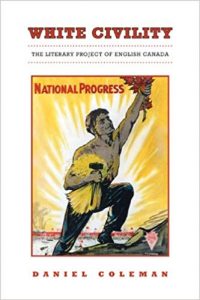1] The Quebec Act of 1774, and the BNA act of 1867 each document the historical ability of Britain, as colonial authority, to accommodate two founding nations in the interest of confederation. Shortly after confederation of the eastern provinces, in 1869, the Metis Nation of Manitoba created a provisional government and attempted to negotiate directly with the new government of the confederationto establish their territories as a province under their leadership. In the end, their leader, Louis Riel was charged with treason – as the CanLit guide puts it, “Canada at the time was not willing to accommodate more than two founding nations.”For this blog assignment, I would like you to outline the reasons why colonial authorities could not conceive of accepting the Metis as a third founding nation. Use the CanLit guide and the summary of Coleman’s argument on the literary project of white civility to substantiate your observations. You might also find part of your answer in The Bush Garden. You should also take into consideration past discussions on ‘the civilizing mission’ of colonialism in Unit 2. Louis Riel also appears in Green Grass Running Water, and accordingly it is worthwhile to do a little outside research around Riel’s provisional government and its attempts to negiciate with the new Canadian government.
In 1869, Louis Riel spearheaded the Metis National Committee which was consolidated as a provisional government for the Metis Peoples. Essentially, the committee represented the Metis rejection of British-Canada’s authority to govern them and aimed to negotiate a settlement between the new Canadian government and the Metis people thereby granting them independence from colonial Canada. However, the Canadian government rejected the Metis demands as being recognized as an independent nation and began to use military force to pressure them into disbanding the committee. This strife with the Metis came at a time when there was both pressure from the American south, and from French Canadians who also wanted their own independence. Thus, it was a risky venture for the Canadian government to fall into conflict with the French sympathized Metis. Their reasons for rejecting the Metis claim of national independence must have been strong. So what were they?

In White Civility: The Literary Project of English Canada, Coleman argues that the Canadian identity was being modelled after an ideal of British whiteness.
“[W]hat has come to be known as English Canada is and has been…the formulation and claboration [sic] of a specific form of whiteness based on a British model of civility…whiteness has been naturalized as the norm for English Canadian cultural identity” (5).
The Metis peoples were seen as an alternative to this ideal. This, like other alternatives such as French and Eastern European worldviews, was considered a threat to white Britishness and had to be neutralized, or eliminated, if Canada was to continue to progress as an independent nation.
Coleman lays out what I will call the moral superiority argument.
“Because Britishness for the English Canadians represented the most advanced form of political and social life in the world, it was therefore assumed as the civil norm to which non-British Canadians should assimilate” (19).
During the late nineteenth and early twentieth centuries, Europeans where “classifying and stratifying humans into a hierarchy of racial types” (13) with the Indigenous peoples being viewed as “uncivilized human beings whose cultures were decidedly inferior to British culture” (12). Moreover, like uncivilized children, the Indigenous could not be bargained with, but rather, placated, manipulated, or forced into complying with their superior British-Canadian rulers.
The Metis where viewed as inferior and treated as such by the Canadian leaders. Riel’s attempts to earn Metis national independence through political, or “civilized”, means was either rebuffed, or, as in 1870 when the Canadian government sent a lynch mob to kill Riel after compromising with him to grant the Metis unique rights and freedoms.
A second thread to Coleman’s discussion is the necessary evil argument. English Canadians believed that there was a single path to civilizations and that through social Darwinian forces – i.e. that “better” societies devour worse ones – the alternative less evolved Indigenous and Metis societies were destined to be swallowed up by British-Canada. The Metis where viewed as being part of a “vanishing race” that was “doomed under the unstoppable wheels of progress” (29). By granting the Metis national independence, the Canadian government would be supporting a lost cause, an impending failure, while hindering its own progress.
“Civilized whites, therefore, must cherish evil memories of the necessary losses that have been incurred so that an enterprising, cultivated society could come into full flower” (30).
Do these myths still play in the Canadian subconscious? Is there an implicit assumption of moral superiority over Indigenous and Metis people, and do Canadians placate themselves with stories of necessity to justify the moral evils that occurred when creating this nation called Canada? Is forgetting and denial the only way we can call Canada home? Perhaps Ernest Renan was right in 1882:
“Forgetting, I would even go so far as to say historical error, is a crucial factor in the creation of a nation, which is why progress in historical studies often constitutes a danger for nationality. Indeed, historical enquiry brings to light deeds of violence which took place at the origin of all political formations, even of those whose consequences have been altogether beneficial. Unity is always effected by means of brutality” (8).
Works Cited
CBCnews, CBC/Radio Canada, www.cbc.ca/history/SECTIONSE1EP10CH4LE.html.
Coleman. White Civility: The Literary Project of English Canada. University of Toronto Press, 2006.
“Louis Riel.” The Canadian Encyclopedia, www.thecanadianencyclopedia.ca/en/article/louis-riel.